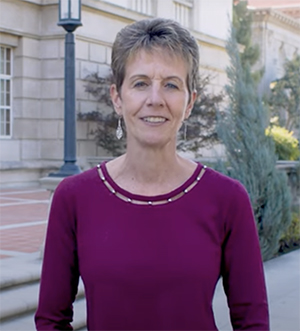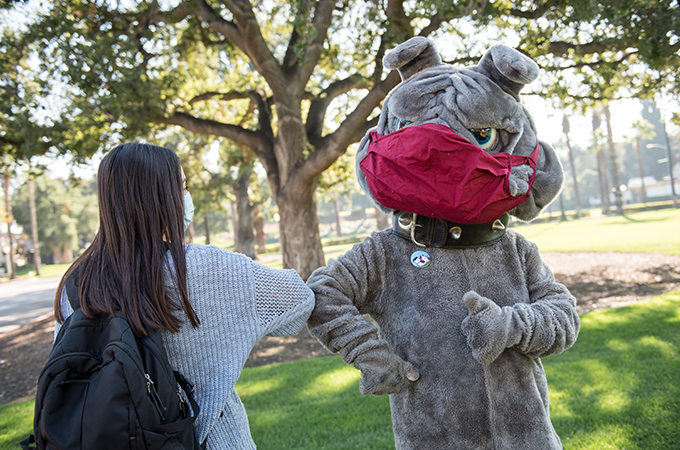In January, about 500 College of Arts and Sciences students arrived on the main University of Redlands campus to live in single rooms in residence halls for the spring semester. Here, University Dean of Student Affairs Donna Eddleman speaks with Mika Elizabeth Ono and Katie Olson of the Bulldog Blog about the early success of the ongoing effort to ensure the health and wellbeing of students during the pandemic.

Bulldog Blog: Let’s start with an update on this very special semester—how's it going from your point of view?
Donna Eddleman: As the result of tremendous commitment of a lot of people across campus, as well as the students and families who made the decision to return to Redlands, this semester is going incredibly well. And that can be attributed to two very specific things. First is our staff members’ commitment to the University of Redlands—to those who came before us and those who will come after us and the students we serve. Another factor is families and students’ love of the place, the relationships that are important to them, and the experience that defines what it means to be a Bulldog.
BB: It was a huge logistical undertaking to invite students back to campus with safety precautions in place. How did your team step up to the challenge?
Eddleman: Everybody had a role to play. Key pieces included the work under [Director of Athletics] Jeff Martinez, who provided student-athletes with COVID guidance specific to athletes while also offering them a Bulldog Athletics experience. He worked to align the higher education guidance provided by the State, County, and the National Collegiate Athletic Association in a way that was manageable and realistic, then communicated that information effectively to make sure students and families understood what the experience was going to be like. The work that came out of Residence Life and Housing under Cassandra Morton's leadership—ongoing messaging and strategies around move-in, logistics, and other systems—also allowed everything to come together. The time and attention we put in really did pay off. Everyone, from Public Safety to Facilities Management, had a huge role to play in the opening of the residence halls.
BB: Another big hurdle was an entry quarantine and testing. How did that go?
Eddleman: We’ve only had six positive cases in the residence halls, with only one positive case following the initial testing of all students in residence. I’m attributing our low case numbers to a willingness, on the part of a whole lot of people, to make this work. While some students have made some poor choices (haven’t we all?), on the whole students really have tried to comply with the expectations articulated in the pledge, which they committed to before they came back to campus. That included quarantining 14 days before arrival, which I believe made a real difference. The first week on campus, I spent a part of each day in Hunsaker Plaza, where, at times, I would approach students sitting, perhaps a little too close, and I would remind them to keep six feet apart. Without exception, students responded to my request, some offering an apology, others asking clarifying questions, while quickly rearranging themselves.
BB: You also created a system to help students who do contract COVID-19.
Eddleman: Yes. The director and the associate director of Recreation and Outdoor Programs, Andrew Hollis and Patrick Whalen, have done a great job leading the Student COVID-19 Case Team. That team consists of six lead case managers and four backup managers, all of whom completed contact tracer training, as well as 15 hours of case response training. During a regular semester, these managers are full-time assistant coaches for our athletic teams. They’ve been tremendous. In addition to Student COVID-19 Case Team, a number of people were golf cart trained in order to deliver food to students in quarantine and isolation; others have volunteered to work the COVID Resource Desk. Campus partners from within the Division of Student Affairs and outside of it have also played important and impactful roles in our efforts to manage COVID cases, as well as the associated risk; the commitment to the student experience is well represented across the University.
BB: What has been the biggest challenge?
Eddleman: Our greatest challenge is going to be keeping up this momentum. At the beginning of this process, I wrote to everyone involved—students and staff—telling them this was their chapter to write in the history of this institution. We are doing a heck of a job in writing the chapter. In a recent follow-up message, I asked everyone to continue to be vigilant in terms of washing their hands, physically distancing, and following other guidelines. We also have to be vigilant in making sure we are taking care of ourselves and each other. Our success is rooted in our vigilance.
BB: Have you seen any changes in students’ mental health needs?
Eddleman: Use of Counseling Center resources is up this semester, which we anticipated with students returning to campus. Students from out of state, who are now living in state, can use counseling center services, something the law does not allow from outside of California. When asked, counseling center staff have tried to help out-of-state students identify resources close to home and they continue to do so. Ultimately, we want to support students and help them find the resources wherever “home” may be. For some students, their best “home” is at the University of Redlands, which is a compliment to our campus culture and our community.
BB: We’re asking students and employees with a presence on the Redlands campus to be tested for COVID-19 once a week. How is that going?
Eddleman: The feedback we've gotten recently is that long lines from the holidays at the County’s on-campus testing site are mostly gone. I was there today, and it took me three minutes to get tested, start to finish. All of the feedback we have gotten has been really positive. One of our U of R employees reported the woman who was testing him said, “Your students are great. They keep their appointments, and they make me feel good about my job and about the future of this country.”
We're very fortunate to have a San Bernardino County testing site on campus, and we're grateful for the work [Vice President of Administration] Michelle Rogers and the Event Services team did to work with the County to fix or adjust testing processes to be more effective and efficient.
BB: Have you learned anything new about the University community throughout this process?
Eddleman: The word that comes to mind is “resilience.” Making the decision to open our residential communities is one thing, but delivering on that promise is a whole different story. There wasn’t an entity on campus that was not in some way impacted by this decision. We’re resilient, responsive, and capable of pivoting. This whole process has been indicative of a capacity we often don't realize we have.
BB: In our previous conversation, you spoke about other crises throughout your career. How has your perspective changed, and what are you drawing on to cope?
Eddleman: Compared to 9/11, the emotional toll in some ways is the same—there's loss of life and widespread disruption. The difference with coronavirus is it is ongoing. As educators, we're enmeshed in the crisis of the pandemic to a level that we’ve never experienced. It is the depth and breadth of the team’s experience, complemented with resources available to us, that has resulted in us pulling everything together. Across this campus, really smart, creative, and collaborative people were all willing to help our community in crisis. We pulled everybody together, figured out who could do what, and then deployed our resources. My team is tired, but we’re proud of the work we’ve accomplished.
BB: Has this crisis changed your perspective on the future of higher education?
Eddleman: I think we have come to realize that online education is possible. For some students, it is the best way to learn, certainly for some graduate students and full-time working adults with children and other obligations. What I hope is not lost, and maybe in some ways has been found again, is the value of a liberal arts education that includes living in a residential community and building relationships through personal interaction. When you talk to families and students who decided on a return to campus, whether at the University of Redlands or elsewhere, part of the decision was based on the value of the on-campus experience.
Learn more about student affairs at the University of Redlands and the University’s response to COVID-19.






